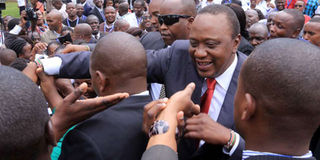Why election scoreboard shows Uhuru 2:0 Kenya after August 8

President Uhuru Kenyatta acknowledges greetings from the Kenyatta National Hospital staff during the launch of a cancer treatment centre on August 24, 2017. Mr Kenyatta remains the lightning rod for ethnic exclusion in Kenya’s power politics. PHOTO | JEFF ANGOTE | NATION MEDIA GROUP
What you need to know:
- Mr Kenyatta rose to the presidency in 2013 largely on the spoils of the country’s political strife five years earlier.
- There is a sense that in Mr Kenyatta’s second term win, Kenya lost the national unity battle again.
Barring a miracle, Uhuru Kenyatta will be sworn in to serve his second term in office as President.
It will mark another personal victory for the scion of Kenya’s most prominent political dynasty.
Yet Mr Kenyatta’s win in this year’s election is only remarkable for the palpable tension that has engulfed the country ever since the Independent Electoral and Boundaries Commission (IEBC) announced the results on August 12.
PETITION
The abating of the muted celebrations in his ethnic support base and the voluble protests in some of the opposition’s strongholds has only given way to uneasy calm.
The petition in the Supreme Court challenging Mr Kenyatta’s re-election has no doubt played its part in extending that period of uneasy calm, but one gets the feeling that Kenyans are still anxious about the day after.
This past week, economist David Ndii stirred public debate with a tweet about a secession petition.
A robust conversation around the petition on social media tended to follow the usual ethnic fault lines.
SECESSION
Come on, what is happening here? Why is there no celebration in this our land?
Why are we getting more of the same ethnic and political sentiment despite Mr Kenyatta having won with a bigger margin and his Jubilee Party producing the majority of governors, senators, and MPs?
Why are we discussing secession? Well, it has got to do with that anxiety thing again.
Mr Kenyatta remains the lightning rod for ethnic exclusion in Kenya’s power politics.
ICC CASES
He rose to the presidency in 2013 largely on the spoils of the country’s political strife five years earlier, turning his prosecution at the International Criminal Court (ICC) over alleged involvement in the ethnic violence into electoral advantage.
This he did by building a solid voting bloc from his community and that of William Ruto, who was also charged with crimes against humanity at the ICC over the 2007/2008 post-election violence.
The cases later collapsed for various reasons, including lack of witnesses.
TRIBALISM
During their first term as President and Deputy President, the duo often came under sharp criticism for running an exclusionist and corrupt regime that favoured their ethnic cronies in senior public appointments and government tenders.
They repeatedly fended off tribalism accusations publicly, of course.
But the appointment trends in the Energy, Transport and Roads ministries, where much of the infrastructure tender money is, suggested they wouldn’t care less in private.
INCLUSIVITY
In this year’s election, Mr Kenyatta made some inroads outside his traditional ethnic base, helped by the massive State resources at his disposal and cannibalisation within the opposition Nasa coalition.
But the lack of excitement about his victory suggests most Kenyans didn’t take it as a vote for inclusivity.
There is a sense that in Mr Kenyatta’s second term win, Kenya lost the national unity battle again.
The scoreboard after the August 8 duel reads Uhuru 2: 0 Project Kenya.
[email protected] @otienootieno





